‘Kanyadan’ backs standard norms,questions tribal culture
Cohabitation may no longer be rampant among tribals but it is not a taboo
Cohabitation may no longer be rampant among tribals but it is not a taboo either,say activists and elected representatives,alarmed at reports that a few women were barred recently from taking part in government-sponsored mass wedding functions after they were found pregnant.
Close to 2.5 lakh marriages have been solemnised under the Mukhyamantri Kanyadan Yojana at hundreds of mass wedding camps across Madhya Pradesh in the last seven years a populist scheme that has its share of controversies like minors tying the knot or beneficiaries marrying again for financial benefits. But its the eleventh-hour attempts to weed out ineligible beneficiaries that have exposed the government to the charge of humiliating women,especially tribals as they are the largest beneficiaries. At 1.53 crore,MP has the highest tribal population in the country.
Cohabitation is not uncommon in tribal society and its definitely not taboo. Neither are rape victims looked down upon nor children born to them. Children born out of wedlock are also not looked down upon, says Anurag Modi of Shramik Adivasi Sangathan,an organisation active in Harda and Betul districts.
The scheme has no bar on pregnant women. In fact,the name is misleading because the scheme is also open to widows and women deserted by husbands. The only condition is that the beneficiary should be from a poor family. But Social Justice Minister Gopal Bhargava says only unmarried girls can benefit from the scheme. We worship the girl child (kanya). How can she be married or pregnant before kanyadan? he asks,criticising PCC chief Kantilal Bhuria for his contrary views. Bhuria,himself a tribal, had said after the reported pregnancy tests in Betul district that cohabitation was common among tribals.
Madhuri of Jagrut Adivasi Dalit Sangathan,an organisation based in Barwani district,says that pregnancy before marriage is not a taboo among tribals and cohabitation not an issue. She says the scheme should be scrapped because it promotes a standardised format that many cultures and societies dont subscribe to. There is no concept of kanyadan among the tribals, she says and objects to the schemes aim to help those who cant afford a dowry. The government distributes resources to buy votes. How can the state take on the role of a dowry-giver when the practice is banned under law, she adds.
Congress MLA from Bhainsdehi Dharmusing Sirsam asks,Why should anyone have a problem if the groom and the bride are comfortable with pregnancy before marriage? The MLA recalls an instance where a pregnant tribal girl got married to her partner. He says the beneficiaries cant be subjected to public humiliation like a pregnancy test after their applications have been screened and accepted.
The government is more worried about the bad press it gets after irregularities are reported. It has now decided to insist on an affidavit from parents saying the prospective bride is unmarried. Action will be taken against parents if the girl is found to be already married a departure from the present practice that seeks to punish only government officials for lapses. The exact proof about a girls marital status can be provided only by parents. Information culled by government employees can never be 100 per cent accurate, says Bhargava.
The scheme is implemented through block panchayats in rural areas and urban bodies in cities and towns and the weddings are organised by an NGO. Couples get household items and gifts worth Rs 15,000.
Before the recent controversies erupted,the Chief Ministers office had asked the Directorate of Social Justice to create a database of beneficiaries.
In a circular,dated June 5,Commissioner of Social Justice told district collectors that a database will be useful to deal with frequent complaints that girls who have benefited from the scheme again get married.








- 01
- 02
- 03
- 04
- 05























